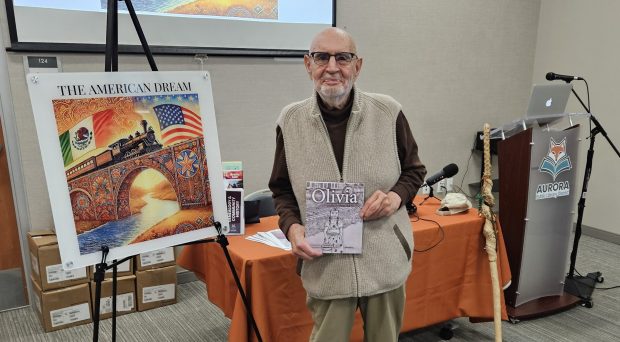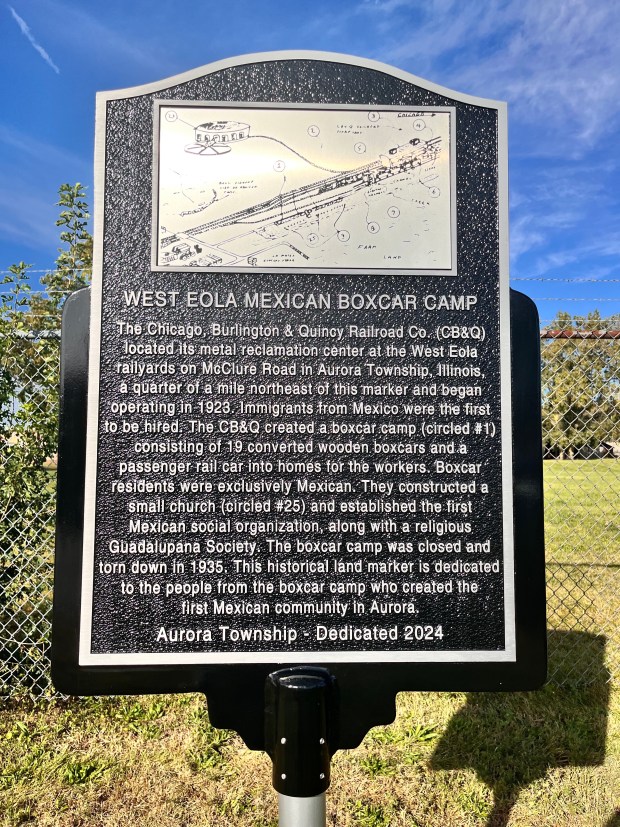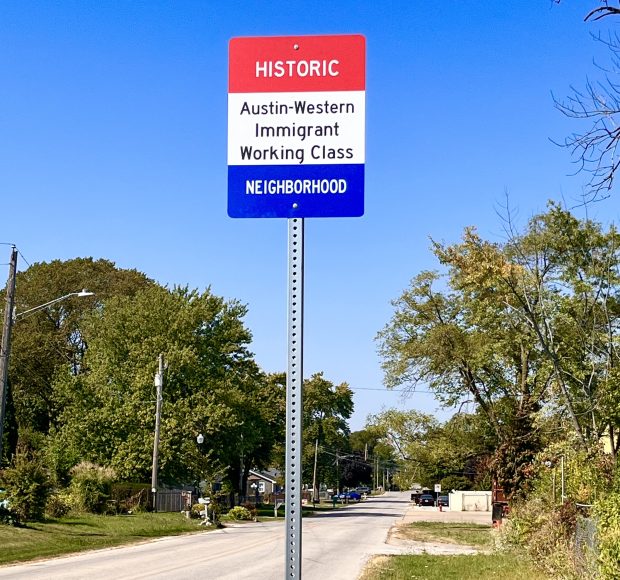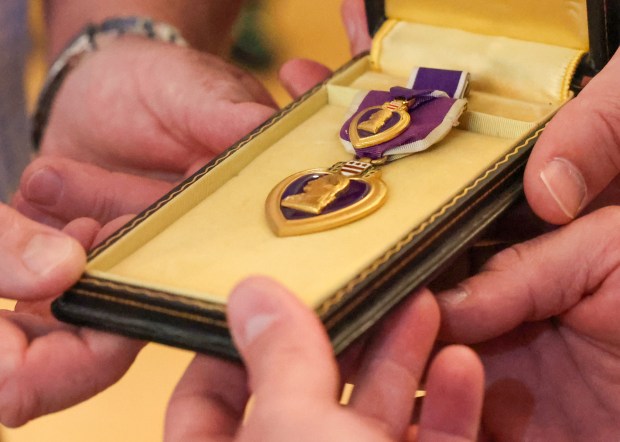A ceremony was held on Sunday at McClure Road and Plain Avenue to honor a part of Aurora Township as the Historic Austin-Western Immigrant Working Class Neighborhood and to unveil a historical marker commemorating the West Eola Mexican Boxcar Camp.
The Aurora Township board approved the honors to “recognize the contributions of generations of working-class immigrants who helped to make Aurora … a major railroad town and major manufacturing center,” according to a resolution passed by the board in the spring.
The Austin-Western neighborhood close to the boxcar camp was home to many generations of immigrant working class families who came from many nations.
“The township specifically wishes to recognize the history of the West Eola boxcar camp, which was the home to some of the first Mexican immigrants to our community,” the resolution stated.
According to information on the Aurora Historical Society website, the boxcar camp was formed by the Chicago, Burlington & Quincy Railroad in the early 1920s as housing for railroad workers.
The camp became a thriving community of families living in old railroad boxcars which had been taken off their wheel carriages, the website states. The community featured its own church, which the residents built themselves.
With the Great Depression, the railroad work force was greatly reduced, and the boxcar camp was dismantled in the mid-1930s, according to the website.
The ceremony last Sunday was followed up Monday night at the Santori Public Library in downtown Aurora, where Aurora resident Alejandro Benavides offered a one-hour presentation chronicling the history of Mexican immigrants to Aurora and a question-and-answer session with audience members.
Benavides explained before his presentation that his research into the boxcar camp began with a book he published earlier this year called “Olivia: Boxcar-Camp Girl & Visionary of La Hispanidad.”
“I was looking into the history of the Mexican boxcar camp and also the history of the first Mexican and Mexican-American immigrants in Aurora,” Benavides said. “It was for a book I was writing and as I was finishing it I was going to publish this book with the actual stories and the people behind it but I began to think that a historical fiction book would be the best way for me to tell the story. As an author, it would give me more flexibility in telling it.”

Benavides said “the information in the book is based on actual events and actual characters but I changed their names.”
“Besides telling the story I also wanted to give readers a better sense of who people of this origin really are,” he said. “The main character in the book had a vision about the area in the boxcar neighborhood and having a historical landmark recognizing it.”
That moment in the book led to Benavides reaching out to Aurora Township about recognizing the history of the Austin-Western neighborhood and the boxcar camp.

“They embraced” the idea, he said, which led to the ceremony on Sunday honoring the historic nature of the area.
Gil Rios of Aurora, a member of the Aurora Township Board, was helping guests sign in at the presentation on Monday and noted the significance of the recent recognition of the boxcar camp.
“It’s to remind people to remember where all the Mexicans came from in the beginning to the city of Aurora. They had no place to go so Burlington put the camp out there,” he said. “I believe there were 19 cars at first and many more. It could have been up to 28.”
“We need to have our history continue so people know how Aurora was built,” he said.
Joe Hernandez of Aurora was one of a number of people at the Monday event who said they had connections with the boxcar camp.
“My father was one of the first to come over here,” Hernandez said. “I don’t remember him living there, but I knew that my dad worked there and we used to go visit him. There were so many men that were brought up here to work the railroad. I don’t think there was anywhere else to stay and they figured they would keep people close.
“As far as the landmark designation, to me this is an important recognition of what the early immigrants from Mexico came and did,” he said.
Yolanda Vera of Aurora said she had connections to the camp thanks to a grandfather “who came to the United States in the early 1920s specifically to work on the railroads and by 1923 he came to Aurora.”
“He stayed working in the railroad until his retirement in the 1950s. He would frequent the boxcars because he had friends there,” she said. “He had co-workers that lived there and there was a church and there were festivities, weddings and such.”
She said the historic designation of the site is important.
“Having the township recognize this, I’m very happy that the Hispanic community is being recognized for the contribution to the city and its development – socially, culturally and economically – because many of those individuals who came to the boxcars planted roots here,” she said.
David Sharos is a freelance reporter for The Beacon-News.




